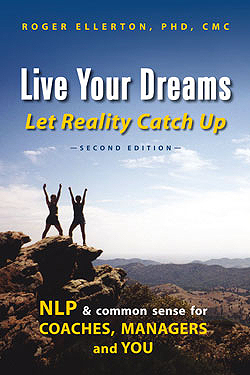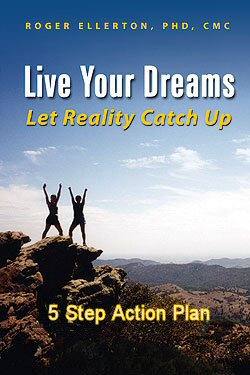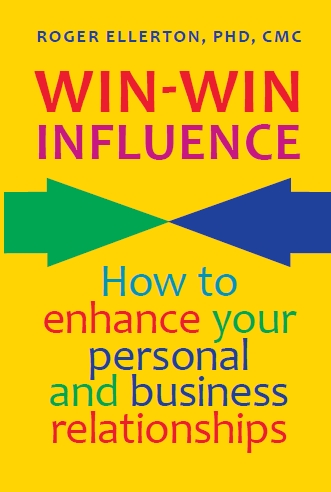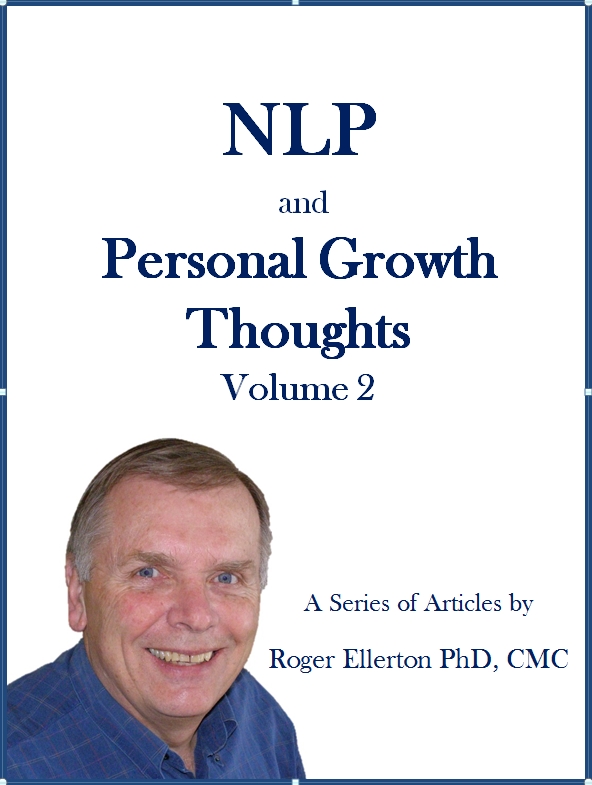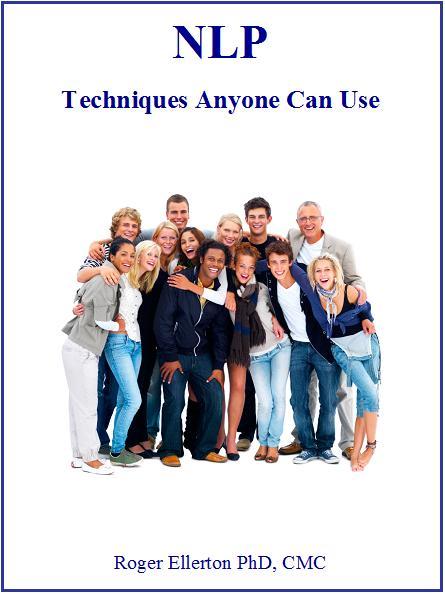NLP Presuppositions, Part I
By Roger Ellerton Phd, ISP, CMC, Renewal Technologies Inc.
This article may not be republished without written permission from Roger Ellerton/Renewal Technologies Inc. If you republish this article without permission, you will be in violation of copyright law and sent an invoice. You may share this and other pages with your friends by linking directly to this page from your website or blog.
The foundation for NLP is a set of presuppositions (beliefs) about ourselves and the world we live in. These presuppositions also serve as principles to guide how we live our lives. Depending on the presenter, the number of NLP presuppositions and the wording may vary, and the basic intent is the same.
The following are my favourites, I hope you enjoy them as well and make them part of your daily life. You may find some of them are already part of your life. You may also find one or more of them confusing or 'not real' - for more information on this, see the article titled The Structure of Reality and the discussion on 'What you don't know you don't know'.
1. You cannot not communicate.
You're in a staff meeting sitting off to one side, with your arms folded, an angry look on your face and are not participating in the discussion at all. Or you choose to not respond to telephone/e-mail messages in a timely fashion, or at all. Are you communicating and what message are you sending? And who are you really hurting?
Through your tone of voice, actions, body language, you are always communicating.
2. The map is not the territory.
I live in Ottawa, Canada. To get an idea of where places are located in Ottawa, I can refer to a map. The map is not Ottawa, but a visual representation. Someone else, with a different purpose in mind, could draw a totally different representation (map) of Ottawa. Both would represent Ottawa and give a different perspective.
In a similar way, you make internal representations (maps) of your experiences in your mind. You remember events through pictures, sounds, feelings, tastes, smells and words. The internal representations you make depend on your filters (beliefs, values, decisions, ...) - see the articles NLP Communication Model, I and II
Your map of an event is not the event. How you choose to represent the map in your mind is what gives meaning to the event. If you and I were at the same event, our maps may be quite different, depending on our filters. If we enter into an argument about the event, we are not really arguing over the event itself, but rather our differing interpretations (maps) of the event. For example, suppose you believe your boss is a horse's ass. What sort of representation (map) will you make of your meeting with him? Will you tend to focus on those things that prove your point? If I am in the same meeting, and I think he is wonderful, how will my map (memory) of the meeting differ from yours?
Your senses take in raw data from your environment and that raw data has absolutely no meaning whatsoever other than the meaning (map) you choose to give it. If you were to choose a different meaning, this would change your experience of that event.
People respond to their map of reality, not to reality itself. NLP is about changing these maps -- not reality.
3. Respect for the other person's model of the world.
We each have our own interpretation of reality (or model of the world). Our interpretations may be quite similar or different.
We each map our experience of the world differently, because we all have different sets of experiences and filters. You may not understand or agree with my behaviour, but if you had my experiences together with my beliefs and values, you might.
You do not have to agree with my model of the world, only respect that I may see, hear, feel, interpret the world and behave differently than you do.
4. The system (person) with the most flexibility of behaviour will have the most influence on the system.
Have you ever been stuck in life, doing the same things over and over again and each time expecting to get a different result? - Definition of insanity! If you want your life to be different, doing the same things more often, harder, louder, is not the way. You must choose to do something different. If you try one key in a lock and it doesn't fit, would you keep trying the same key over and over again? Or would you be flexible and try other keys until you find the one that works?
Same for your life, be flexible and explore different behaviours/strategies to unlock what you truly want in life or who you are destined to be.
At work, I am sure you have noticed two types of people. One person who is very inflexible and tries to control everything. They live under the illusion that they are in charge. In actual fact, their co-workers are finding workarounds in order to avoid dealing with them. Then there is the other person. People enjoy talking to her and helping her with whatever needs to be done. Why? Because by being flexible in her behaviour, she is able to communicate with everyone and people see her as a valuable co-worker.
If you are a parent, consider the following: There are no resistant children, only inflexible adults.
In the article, NLP Presuppositions, Part II, I will present five more NLP presuppositions and discuss how you can use them in your daily life. If you look hard enough, you will probably find an example where these presuppositions do not apply. My suggestion is you focus on those times when they do apply and explore how they can change your perception of life and your results.
And NLP is Much more than that!
Author: Roger Ellerton is a certified NLP trainer, certified management consultant and the founder and managing partner of Renewal Technologies. The above article is based on his book Live Your Dreams Let Reality Catch Up: NLP and Common Sense for Coaches, Managers and You.
Copyright © 2003, Renewal Technologies Inc. All rights reserved.


